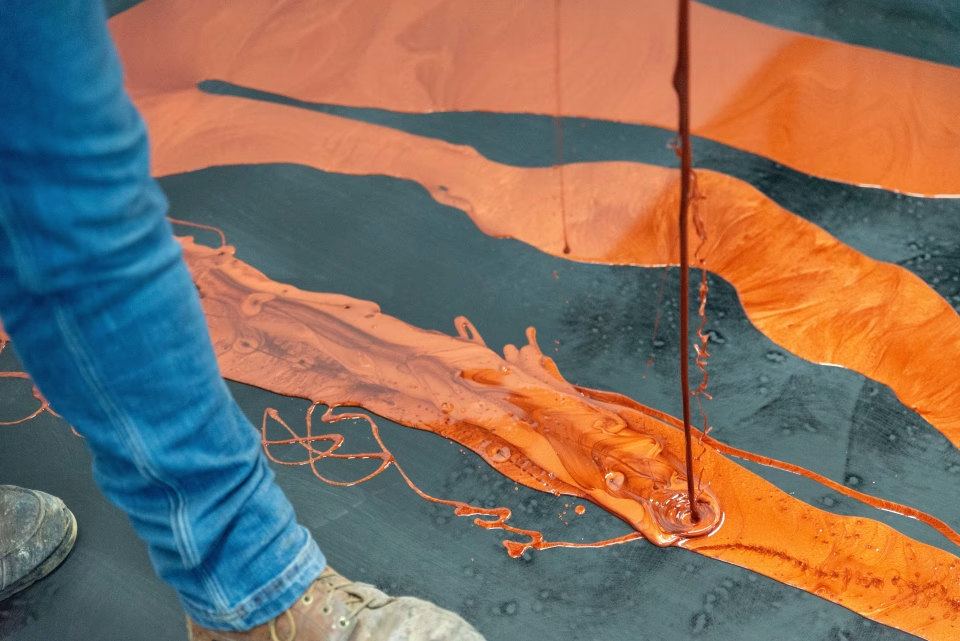
Ever wondered why some projects use epoxy and others use resin? Both are popular in crafting, but they’re not the same. This guide will break down the differences—so you can pick the right one for your next project.
Understanding Resin and Epoxy
Resin is a sticky, liquid material that hardens into a solid—think of it as the base ingredient for many crafts and coatings. Epoxy, on the other hand, is a specific type of resin made by mixing two parts: resin and hardener, which creates a strong, durable finish.
What is Resin?
Resin is a sticky, liquid material that hardens into a solid. It’s often used in flooring, crafting, and jewelry making. Think of it as a versatile glue or coating that can turn into something durable and shiny.
Resins are synthetic polymers—basically, man-made plastics—that come from mixing chemicals like polyester or epoxy with a hardener.
There are different types of resin, such as casting resin and epoxy resin. Casting resin is great for creating molds or detailed pieces because it flows easily and cures slowly. Epoxy resin, on the other hand, is thicker and often used for coatings or adhesives due to its strength and waterproof properties.
What is Epoxy?
Epoxy is made by mixing two parts—a resin and a hardener. When combined, these components create a strong chemical reaction, forming a durable and rigid material.
Epoxy has unique properties like high clarity, waterproof abilities, and resistance to wear and tear. It’s often used in crafting art pieces, coating surfaces like tabletops or floors, or even as an adhesive for heavy-duty projects.
Its strength makes it ideal for projects requiring long-lasting results (and yes, it’s perfect for those who want their creations to survive spills and scratches). Whether you’re working on fiberglass repairs or sealing artwork, epoxy delivers both flexibility and rigidity where needed most!
Key Differences Between Epoxy and Resin
The term epoxy resin can be a bit misleading. Here’s how it works:
- Resin is a broad category of substances that can be natural (like tree sap) or synthetic (like polyester, polyurethane, or epoxy resins).
- Epoxy resin refers specifically to the part of the epoxy system that contains reactive epoxide groups. It’s not a fully cured or usable material on its own.
- To create epoxy, you mix epoxy resin (the base) with a hardener (a curing agent), which triggers a chemical reaction (cross-linking) that turns it into a hard, durable solid.
So, while epoxy resin is called a “resin,” it’s really just one half of the equation. It only becomes epoxy once it’s mixed with a hardener.

Composition and Chemical Structure
Resin and epoxy are both synthetic polymers, but their chemical structures set them apart.
The key difference lies in how they’re built. Regular resins often rely on single-part formulas or simpler curing processes. Epoxy’s two-part system forms cross-linked polymer chains during curing, giving it superior strength and waterproof properties.
It’s like comparing glue to superglue—epoxy just sticks better (and harder).
Viscosity and Application Methods
Epoxy and resin differ in viscosity, which affects how they’re used. Epoxy is thicker—think honey-like—making it great for coating surfaces like tabletops or floors. Its thickness helps it stay in place without dripping.
Both materials have unique uses, but their viscosity determines whether they’re better suited for coating or casting tasks.
Durability and Hardness
Epoxy is known for its toughness and resistance to wear. It forms a hard, durable surface that can handle heavy use—perfect for flooring or table tops. Once cured, epoxy becomes waterproof and resistant to scratches, making it ideal for high-traffic areas.
Resin, on the other hand, varies in hardness depending on the type. Polyester resin is less rigid than epoxy but still offers decent durability for crafting and casting projects. Epoxy’s strength comes from its chemical structure—epoxide rings create a tight bond during curing, giving it superior hardness compared to many synthetic resins.
Conclusion
So, what’s the deal with epoxy and resin? Epoxy is a type of resin, but not all resins are epoxy. Think of it like this—epoxy is tougher, dries harder, and works great for heavy-duty jobs like flooring or sealing.
Regular resin? It’s more flexible and often used in art or jewelry. Both have their place… just depends on what you’re making! Whether you’re coating a table or crafting something beautiful, knowing the difference helps you pick the right one.
At Optus Resin Technology, we specialize in high-performance resin solutions tailored for a wide range of applications. From epoxy coatings to polyaspartic, polyurethane, and hybrid resin systems, our products are engineered for durability, chemical resistance, and long-term performance. Whether you need flooring solutions, protective coatings, or specialized industrial resins, we provide expert formulations to meet your needs.
Need help choosing the right resin for your project? Contact us today and discover the best solution for your application.





